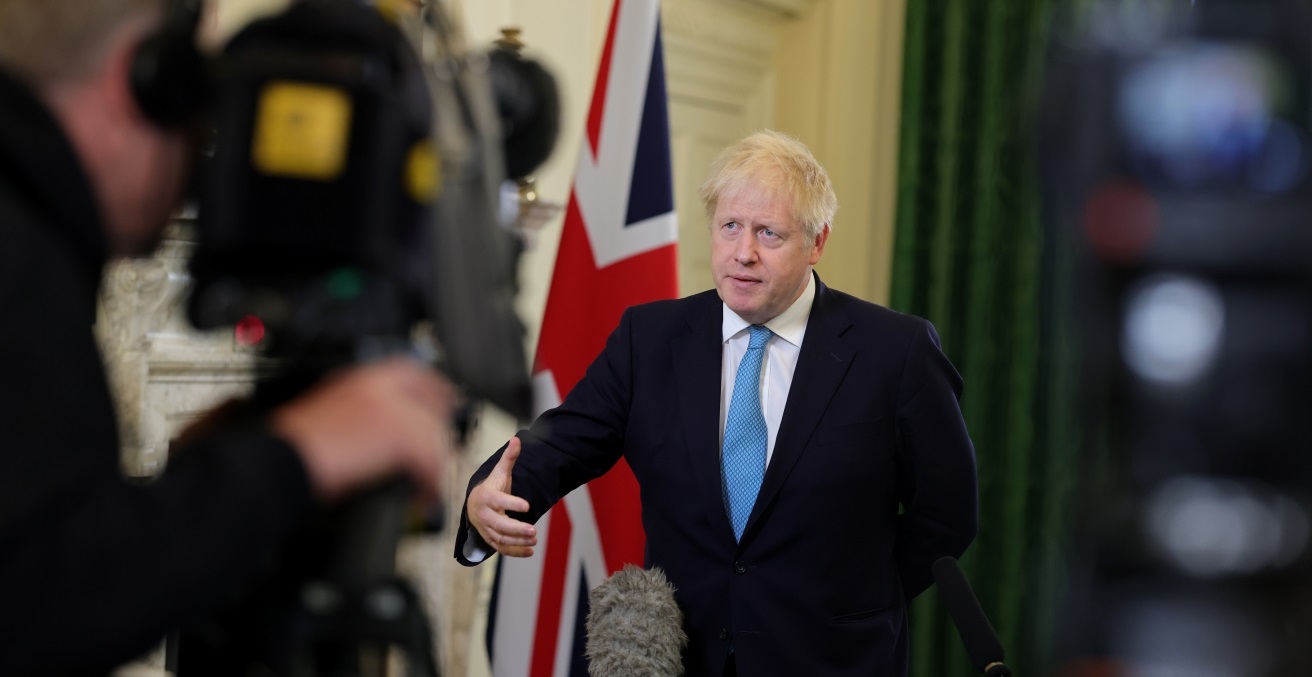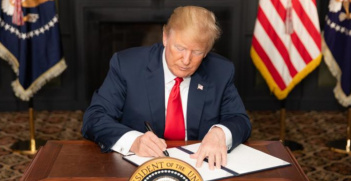The European Council of Ministers on Brexit, Russia, COVID-19, and More

Last week, Europe’s Council of Ministers convened virtually. Their meeting was hijacked by debate, the terrifying resurgence of the pandemic across the continent, and a gritty and irritable discussion on Boris Johnson’s latest antics on Brexit.
I had told AIIA colleagues that in the middle of the German half-year presidency of the Council, the Germans wanted to focus on the serious issues confronting the European Union, and that the final days of Britain’s dishonest pledge to secure a free trade deal with the EU when it leaves the bloc on December 31 would only be a sideshow. After all, the British prime minister had put into the Westminster parliament legislation negating pledges he himself had approved and signed in the Withdrawal Agreement with the EU president last December, an act described by members of his own cabinet as breaking the law. This led Ursula von der Leyen, the European Commission president, to announce that the EU would take legal action if Britain passed the legislation. It is currently being held up by the House of Lords.
After devoting a chunk of time at their summit in animated debate, the EU ordered its chief negotiator to travel to London on Monday to try and revive negotiations. Johnson in effect told him not to waste his time, unless he came with major concessions on sticking points. Having done almost nothing to progress the agreed negotiations on the trade deal he had committed to, Johnson abruptly told Brussels as the Council was meeting that he was planning for an Australia-style arrangement, a euphemism for no deal. He did this through a Downing Street recorded video, released to the press.
All of Britain’s significant business groups signed s letter demanding Johnson try to agree a deal, but all the prime minister would do was agree to meet 250 of their leaders in a 20-minute video call also joined by Michael Gove, the minister planning for a no-deal Brexit. Those on the call described it as “terrible” and “insulting.” Causing particular offence was a remark by Gove that they should consider Britain’s no deal as nothing more than “moving house,” when most businesses expect to lose substantial sums, and GDP is estimated to drop by 10 percent.
Despite the distractions, Europe’s leaders and policymakers do have a broader focus.
For Germany’s chancellor Angela Merkel there are many more concerns than Brexit. Germany holds the chair of the policy-making Council of Ministers for the second half of this year, and this period provides the last chance for Merkel to show her leadership qualities in the EU.
Although the coronavirus epidemic remains a pressing issue for the EU bloc, handling the health issues remains mostly a national matter. The Brussels Commission is well underway in effecting the controversial distribution of the €750 billion capital raised earlier this year to combat the impact of COVID-19 on the 27 member countries.
Merkel’s top concerns are ones she shares with France, Poland, the Baltic states, and indeed Britain, and that is relations with a threatening Russia, and the strategy of its leader, president Vladimnir Putin. Having grown up in the Ulbricht years of Communist East Germany, Merkel is painfully aware of the new cold war evolving between the United States and China and is deeply apprehensive of President Xi Jinping’s growing militancy. Like most Europeans, she is apprehensive of what could happen should Donald Trump win a second term in the White House on November 3. On top of these concerns are dissent and divisions within Europe on how to deal with asylum seekers and economic refugees, on hastening the pace to combat climate change, and on improving everything from technology and competitiveness to human rights and tensions in the eastern Mediterranean among Greece, Turkey, and Cyprus. And then there is Brexit. As mentioned, serious discussion of these issues was largely brushed aside at last week’s European summit and the additional one called a week earlier.
Arguably, the EU’s biggest concern is Europe’s eastern front, with the pertinent question being how to deal with President Putin. Neither Brussels nor Berlin have yet been able to cobble together an effective response to acts of aggression or provocation deemed to have emanated from the Kremlin. The question has been live since a Malaysian Airlines jet was shot down by a Russian missile in 2014 killing all on board, including 28 Australians. Just a few weeks later Russian special forces invaded Ukraine. Then there was the dramatic case of Sergei Skripal, a former Russian military officer and a double agent for British intelligence services, and his daughter Yulia who were found poisoned at their home in Salisbury, England. After many weeks in intensive care they recovered. Scientists found a Novichok nerve agent had been used, the origin of which detectives traced to Russia. The EU and other countries supported London’s protests, which led to the expulsion of 153 Russian diplomats worldwide.
Novichok was at the centre of another drama directly involving Germany when Merkel sanctioned a mercy flight to rescue Alexei Navalny, a leading Russian dissident who lay dying in a Siberian hospital after drinking a mug of tea that had been laced by the nerve agent. Merkel chose to announce the results of the toxicology report herself, blaming the Kremlin. The EU has introduced sanctions on a number of Russians, and Berlin is considering pulling out of the controversial Nord Stream 2 gas pipeline project. The EU is also concerned about recent events in Belarus.
China is Germany’s largest trading partner, and Berlin is profoundly against the Trump administration’s attempts to single out its businesses’– and those of the EU – if it does not fall in line with his policies by curtailing deals with China, particularly in the case of using Huawei technology in 5G telecommunications. Berlin had also been counting on Beijing to move faster in combating greenhouse gas emissions, and was less than impressed with Xi’s recent address to the United Nations General Assembly claiming China’s great commitment to be carbon neutral by 2060. Not only is this ten years later than the UN global target, but the Beijing plan also includes significantly increasing its coal burn through the construction of a number of new coal-fired power stations.
European leaders spent some time discussing climate change. They agreed to accelerate action across all 27 member countries and to “create a level playing field preventing carbon leakage.” At present, the EU is committed to a 55 percent reduction in carbon emissions by 2030. Last week they agreed to look towards setting a bigger target cut at their December meeting.
Even without Britain, the European Union is the largest market for goods and services in the world. It knows Russia, China, and Trump’s America would like to split it apart, leaving it weak and divided. The Johnson government, if not the British people, feels the same. That is why Brussels and Berlin are hoping that the polls are correct and that Joe Biden will be elected president next month. They are comforted by Biden’s clearly stated pledge to reset four years of isolationist foreign policy under a new banner of “Restoring America’s Leadership” to replace Trump’s “America First.”
Under this banner, Biden pleases Europe by pledging to stop the US withdrawal from the World Health Organization – for which the EU summit pledged additional support – to immediately re-enter the Paris climate change accord, to line up with Europe in rejoining the Iran nuclear deal, and reverse Trump’s war of words with Europe on NATO.
Foreign policy issues have not been a major feature of the US election campaign, but significantly, the Democratic candidate has Obama’s former deputy secretary of state, Tony Blinken, as his foreign policy adviser. Blinken has vowed to end what he termed the “artificial trade war” with the EU. Blinken, speaking at a US Chamber of Commerce event last week, made it clear that repairing economic relations was an essential element of Biden’s foreign policy strategy. This will mean taking off the table Trump’s so far unfulfilled threats of tariffs on European auto industry exports to America, where upmarket vehicles and components from German producers BMW, Audi, and Mercedes Benz have a significant slice of the luxury car market, and removal of tariffs on Scotch whisky, although Britain will be a standalone country by then.
But European business and industrial leaders are not naïve; they know that while transatlantic political relations should improve, there will still be thorny trade problems. There is the vexed issue of competitive subsidies to Airbus and Boeing, and arguments over the shortfalls in corporation tax paid by Silicon Valley tech giants, to name but two. What most agree on is that if Trump wins on November 3, it will get much worse.
Colin Chapman is a writer, broadcaster and public speaker, who specialises in geopolitics, international economics, and global media issues. He is a former president of AIIA NSW and was appointed a fellow of the AIIA in 2017.
This article is published under a Creative Commons Licence and may be republished with attribution.





